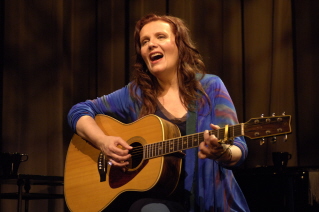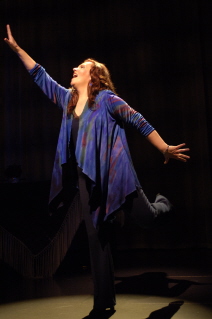A Long and Winding but Satisfying Show
Maureen McGovern’s one-woman retrospective meanders through her life and times but ultimately enthralls with glorious song
At 60 years of age, enduring songstress Maureen McGovern has a voice every bit as smooth, rich and powerful as the one that catapulted her to fame in the 1970s.  Known for turning the Oscar-winning disaster movie themes from The Poseidon Adventure and The Towering Inferno into pop music classics, McGovern is currently using that golden voice to reminisce about her career and the historic events that influenced her in a one-woman show titled A Long and Winding Road.
Known for turning the Oscar-winning disaster movie themes from The Poseidon Adventure and The Towering Inferno into pop music classics, McGovern is currently using that golden voice to reminisce about her career and the historic events that influenced her in a one-woman show titled A Long and Winding Road.
Now through November 15 at the Huntington Theatre Company’s Wimberly Theatre at the Boston Center for the Arts, McGovern is sharing a generation of stories and song that have every Baby Boomer in the room nodding vigorously in recognition. Tunes by Bob Dylan, Simon and Garfunkel, Carly Simon, James Taylor, Joni Mitchell, Laura Nyro, Carole King, Joan Baez, The Eurythmics and The Beatles all punctuate her very personal memories of life, love, and the turbulent times that turned a “good Irish Catholic girl” from Ohio into a resilient and resourceful voice of inspiration and hope.
While aiming to tie together her own tumultuous journey to the events of the decades that have shaped her, McGovern at times lets her narrative bounce back and forth incoherently from her childhood to the present to the protest era. She often skims the surface of painful memories and makes light of major milestones and moments. However, once she settles more solidly into the decades of JFK, Vietnam, and the AIDS epidemic, her folk music persona takes over and delivers penetrating renditions of iconic songs.
A loving tribute to her father, a veteran of WWII and the Korean Conflict, begins an extended set of poignant time-spanning ballads including “The White Cliffs of Dover,” “Carry It On” and “Let It Be.” In each McGovern reinterprets the material to express her own unique connections. A particularly moving segment introduces us to one of the Kent State Four, a former classmate of McGovern’s whose youthful innocence contrasts sharply with her tragic end.
McGovern also lets her humorous side break loose from time to time, and when it does she becomes relaxed and quite delightful. She has an easy, self-deprecating wit that is sparked by an exuberant twinkle.  In two surprising numbers she combines her remarkable vocal dexterity with an understated impish grin. She first frolics through a manic medley of the greatest Doo Wop hits of the 1960s, and later she enjoys a very funny riff on Tom Lehrer’s satirical “The Vatican Rag.” She caps off her comedic showcase with a devastating story about a blind date that goes very, very wrong.
In two surprising numbers she combines her remarkable vocal dexterity with an understated impish grin. She first frolics through a manic medley of the greatest Doo Wop hits of the 1960s, and later she enjoys a very funny riff on Tom Lehrer’s satirical “The Vatican Rag.” She caps off her comedic showcase with a devastating story about a blind date that goes very, very wrong.
All in all there are many worthwhile stops along McGovern’s Long and Winding Road: the nostalgic chords struck in songs like “The Circle Game,” “Will You Still Love Me Tomorrow?” and her three mega-hits, “Can You Read My Mind?” “We May Never Love like This Again,” and “The Morning After;” the sadness and determination of Stephen Schwartz’s “Life Goes On” when contemplating the devastating effects of AIDS; and the heartbreaking irony of the usually joyous old Irish hymn “How Can I Keep from Singing?” when juxtaposed against the terrifying story of a ruptured vocal chord.
But there are bumps along this convoluted road, as well. McGovern’s script seems to meander aimlessly at times, and in an effort to touch on every landmark in her life, she gives many important events and relationships short shrift. She also sometimes presents mere snippets of songs, teasing us with the promise of fond memories but failing to satisfy fully.
Judicious editing of her narrative and a stronger framework for her songs could turn A Long and Winding Road into a powerful reminder of the force that music has played, and can continue to play, in our nation’s and our personal histories. As currently conceived, McGovern’s solo retrospective is not much more than a pleasant trip down memory lane.
PHOTOS BY ERIC ANTONIOU - Maureen McGovern